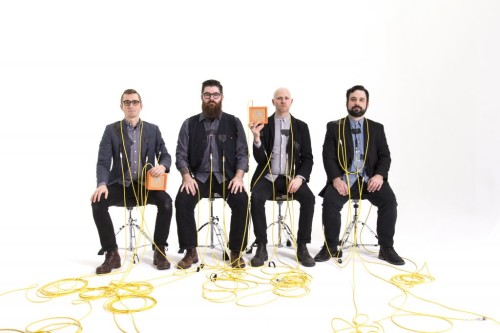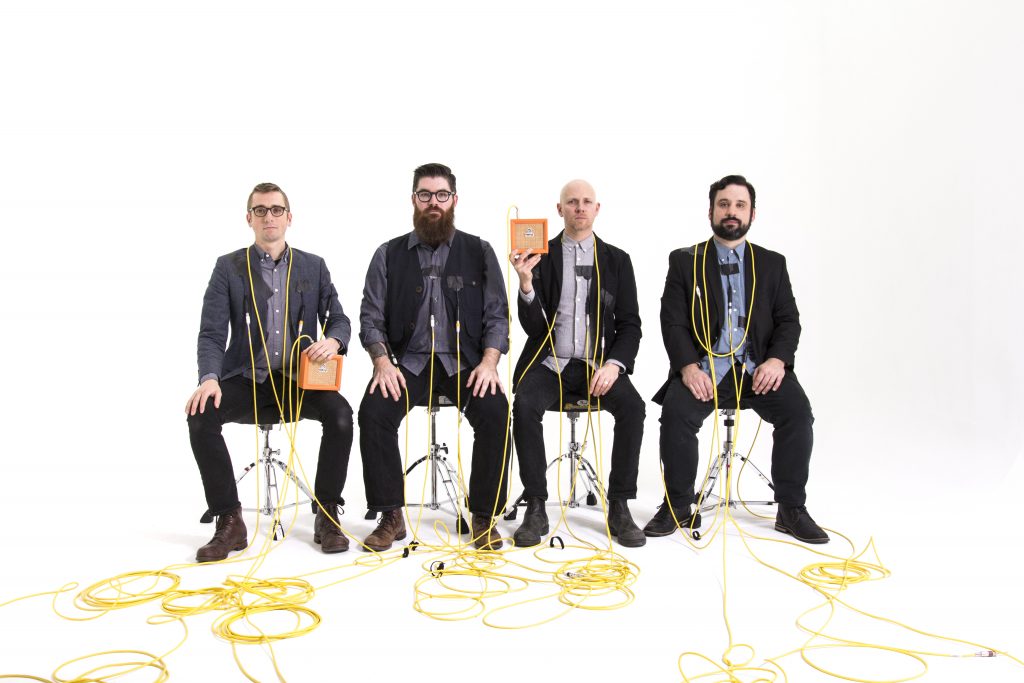 United States Dessner, Shaw, Crumb: Dawn Upshaw (soprano), Gilbert Kalish (piano), Sō Percussion (Eric Cha-Beach, Josh Quillen, Adam Sliwinski, Jason Treuting), presented by San Francisco Performances, Herbst Theater, San Francisco. 26.10.2017. (HS)
United States Dessner, Shaw, Crumb: Dawn Upshaw (soprano), Gilbert Kalish (piano), Sō Percussion (Eric Cha-Beach, Josh Quillen, Adam Sliwinski, Jason Treuting), presented by San Francisco Performances, Herbst Theater, San Francisco. 26.10.2017. (HS)

Bryce Dessner — Music for Wood and Strings
Caroline Shaw — Narrow Sea
George Crumb — The Winds of Destiny (American Songbook IV)
Sō Percussion has raised the game on percussion as chamber music. Not for them, the theatrical showmanship of Blue Man Group and Thunder From Down Under, as clever and exciting as those can be. Last Thursday evening, Sō Percussion made its first San Francisco Bay Area appearance, and found unexpected warmth and cuddliness, often with subtle strokes rather than pounding. The effort was aided and abetted by the pure lyric voice of soprano Dawn Upshaw, and a clearly enthused Gilbert Kalish on piano.
The apex of the evening was George Crumb’s restless 2004 setting of seven Civil War songs, The Winds of Destiny. With familiar tunes such as “Mine Eyes Have Seen The Glory,” “When Johnny Comes Marching Home,” and “Shenandoah,” Crumb assigns quiet rattles, shufflings and rustlings to four percussionists on a stage full of instruments, and one piano played mostly with unconventional means. All the while, the soprano sings mostly straight but sometimes nontraditionally, adding ambience and other effects.
This is actually my second hearing this year of Crumb’s opus. In August, an all-student percussion ensemble featured it at the Aspen Music Festival. This time around, it revealed more fluidity and texture. Certainly Upshaw was a big part of that. Her comfort with contemporary works can produce impressive results: “All My Trials, Lord” and “Go Tell It on the Mountain!” were extraordinary for their passion.
But savvy presentation by the percussionists was the key.
At one point all attention focused on the piano. Gilbert Kalish pressed keys and leaned into the open harp to strum strings, while all four percussionists created a hauntingly complex sonic texture by manipulating strings with sticks, mallets, and their own hands.
Subtle amplification added richness and depth to all the instruments’ sound. Deft engineering spread a sheen of textural color, and also brought the individual instruments’ timbres into a more coherent balance, both among themselves, and against Upshaw’s naturally pure sound. This performance judiciously removed some of Crumb’s more pretentious elements (for example, rattling chains to evoke slavery during “Johnny,”), making for a more satisfying experience.
Preceding this 45-minute work were two lively examples of even fresher ink. Written in 2015 on commission from Carnegie Hall, Bryce Dessner’s lively, tuneful and rhythmically joyous Music for Wood and Strings—actually a 15-minute excerpt from its 35 minutes—opened the concert. The piece uses four unique hybrids of hammered dulcimer and electric guitar to create suggestions of everything from a wailing guitar to a deep bass line. Short violin bows and eraser-topped pencils elicit the sounds, both from these instruments and from wood blocks of various sizes.
The results were mesmerizing, ranging from soft, eerie wisps to lively dances that called to mind both barn dances and rock ’n roll licks. Shifting rhythms and resolutely pentatonic melodic lines made Dessner’s creation highly listenable.
Caroline Shaw’s Narrow Sea, which this group debuted earlier this year at Pennsylvania State University, used mallet instruments (marimba, xylophone, vibes) to create a gentle atmosphere that could grow into something ecstatic over its half-hour duration. Upshaw began and ended with lines from the hymn “Wayfaring Stranger,” deconstructing the melodic material on “I’m just a-going over Jordan, I’m just a-going over home,” as if the music were folded like origami.
Shaw’s score connected palpably with Crumb, and her harmonic simplicity nicely reflected Dessner. It made for a smart and appealing program.
Harvey Steiman
